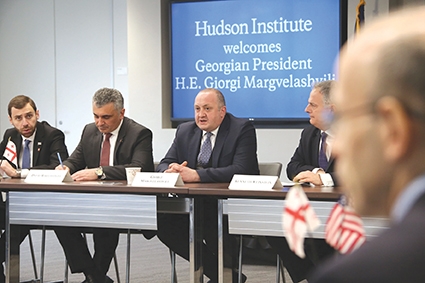Georgian President in Washington Talks US, NATO, Russia in Interview with Foreign Policy Magazine
President Margvelashvili is meeting members of Congress and making appearances at think tanks in Washington this week. In an interview with FOREIGN POLICY, he talked about the goals of his visit, US-Georgia relations and Tbilisi’s NATO aspirations, amongst other topics.
Margvelashvili explained that he was looking not only to accelerate and upgrade bilateral relations, but to emphasize military cooperation too.
We are “looking to really accelerate and upgrade our bilateral [relations]. Because we have quite an impressive cooperation developed during the past year with the vice president’s visit, with the visit with the senators on both sides of the aisle, then continued with appropriate declarations from the Hill. We should very much emphasize also the military cooperation. All of this is extremely positive. Yet, we need to further the process. Let’s put it this way: We’ve seen support for Georgia, but the support was not enough for Russia to refrain from [its activities in] Ukraine,” he said.
On the subject of Georgia’s NATO aspirations, Marvelashvili told FOREIGN POLICY staff writer Emily Tamkin that “Georgia has basically done everything that was a requirement for our country, in the context of reforms, in the context of — well, any kind of the “to-do list” that has been given by NATO to Georgia during these 10 years has been accomplished completely and acknowledged by NATO. And we have to mention our standing together on the battlefields. We have done everything on our side and contributed strongly to global security, while we don’t enjoy ourselves the benefits of global security. That’s where we are right now.”
Margvelashvili also commented on the positive relationship that Tbilisi has had with the Trump administration, and Georgia’s relationship with Russia.
“The situation with Moscow is stalled. We have been hoping that at some point Moscow would start looking not from the perspective of tension and confrontation, but from a perspective of really bringing a better future for the peoples that are living within Georgia, within the occupied parts of Georgia, [and] the peoples that are living in Russia. But we don’t think that, really, this time and moment and phase of Russian history is the right moment to expect that sentiment to emerge within Russia’s highest circles. With President Putin’s re-election campaign, we see quite the opposite: the rhetoric of the Cold War.
“On the Trump administration side, 2017 was a total positive… our experience with the Trump administration on Georgia-related issues has been positive,” he told FOREIGN POLICY.
Máté Földi












